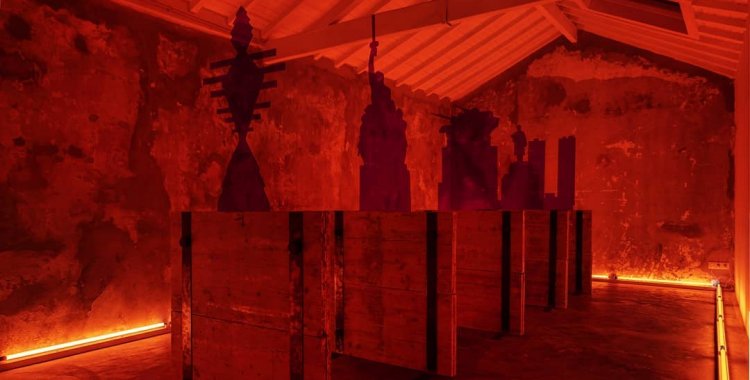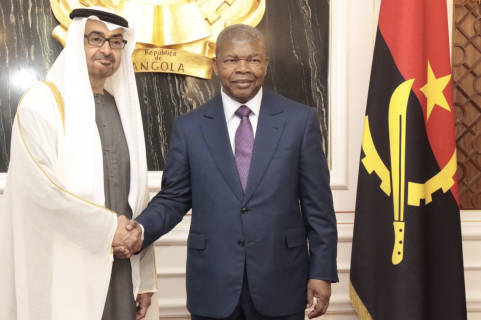"I think there was an almost period of denial in Angolan society in the reflection on those historical periods [colonialism, the post-independence period in 1975, and the civil war]. This is extremely worrying for me," he said, questioned by Lusa about her country's historical perspective.
Born in 1979, Kia Henda's work addresses collective memory, public spaces, and society. He has reflected on post-colonialism in several exhibitions and creations, "since 2010," with works such as "Redefining the power," on the movements for the removal of monuments that have emerged in America, Europe, and also Africa.
On his way to the Rotterdam International Film Festival, where he will present the performance "Red Light Square - history is a bitch project: Kinaxixi", about the Largo de Kinaxixi, in Luanda, a project developed in residence in Porto, Kia Henda also hopes to install, this year, the Memorial of Homage to Slaveholders, in Lisbon.
In the artist's opinion, there is "a great reluctance to face these ghosts of the past", maintaining "cycles of violence that have remained open since slavery, since colonialization".
"Then we tried to debate post-colonialism when we weren't even careful to debate post-slavery, the impact it had. (...) There are a lot of accumulated periods that we haven't been open to debate," he comments.
At the moment in Angola, he says, there is "a period of great indignation", especially "for everything that has happened in the last 15 years", from corruption to the "squandering of public goods", and this "fixation with the present" means that no one can tolerate "or bother to make a reflection that also involves a historical perspective on what we live today".
"This is a continuous mistake, because we can never have a concert of thoughts in any direction if we don't have access and debate our history," he added.
From Angolan society to Portuguese society, he sees in this country "a kind of complicity - there still is - in what happens in Angola.
"When you talk about the situation in Angola, the social chaos, the tremendous economic crisis, and if you try to talk about colonialism, you [Portugal] say, 'I don't want to talk about it, what does it matter? I want to talk about today, about money laundering...'. And if we look and think, where did all that capital delapidated by the Angolan state go? Once again, to the former Western power. Most of it, not all of it, but most of it," he criticizes.
To face this attitude, he defends, "it is important to have a serious reflection on these different periods of history," with a frontality that questions "what is this about being brotherly peoples.
Without this openness and availability, in a "sincere and calming way, not inciting to hatred or the awakening of ghosts", it is difficult "to take a new direction, what can be called a true brotherhood".
"We have to be aware that, throughout all this history, many people have experienced traumas, people have had completely unstructured lives, and there is a need for the debate to be clearer and more open," he considered.
For "there to be a redemption," the artist stresses, it takes "the courage to admit these moments of shame," and not maintain "this reluctance" around what "is the formation of Portuguese identity, which goes through this moment of 'Discoveries', of the colonies.
For Kia Henda, it is necessary "to have the courage to look and think 'Well, what we consider our identity has a lot of tragic points, a lot of shameful moments'," she said. "And many times there is this reluctance.
Still, he remains "very optimistic" about the future in the short term, especially as he sees that "there is an increasingly conscious youth" in Angola and Portugal, with "the will to confront these social and historical issues, which are still disturbing today.
Affirming "all solidarity" for the international Black Lives Matter movement, which he considers an example, he sees a "revolt that lived inside many people finally going out to the streets", finding society in a "very special moment", without a "way back".
"When it has to happen, power comes out of institutions, out of places ruled by politicians. Because power is in the streets, in whom it has to face and live the day-to-day," he reiterated.
The demonstrations are not, he said, "something that happened in 2020 and that's it.
"Right now, a radical change is taking place on fundamental issues, such as racial issues, post-colonialism, on how we want to feel represented, [and on] what we believe can be celebrated or not," he assured.
"There is talk of a great clash of distinct beliefs, visions about the world, but there is no one who can stop evolution. We can call this empathy about what oppressed people live," he said.
A multidisciplinary artist who works mainly with photography, video and performance, Kia Henda's work is marked by reflection on collective memory and public spaces.
In 2012, he received the National Art and Culture Award, in Angola, and, in 2017, the Frieze Artist Award, given by the London art fair with the same name, dedicated to emerging young people.
He has already participated in initiatives such as the São Paulo Biennial, and was selected for exhibitions at the Centre George Pompidou in Paris in 2020, the Tate Modern in London in 2018, and the Guggenheim in Bilbao in 2015, the same year he was part of an exhibition at the Smithsonian in Washington.
The exhibition "Something Happened on the Way to Heaven" is still on show in the Municipal Galleries of Avenida da Índia, in Lisbon, focusing on the expectation of immigrants crossing the Mediterranean to find a Paradise in Europe, which they do not find.
The slavery memorial in Lisbon, entitled "Plantation - Prosperity and Nightmare", is scheduled to be concluded at the end of the first quarter of this year.







